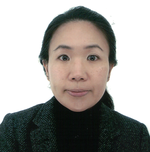
- This event has passed.
Friday, October 13, 2023 @ 12:30 pm - 2:00 pm EDT
Oct 13, Friday 12:30 – 2pm
Event Registration and Access:
- In person participants please register here.
- Online access on Teams – Join here. Meeting ID: 249 895 505 059
Confirmed Talks:
-
Title: “Tech Hubs and the AI Industry in Africa: What Drives?”
 Speaker: Caroline Wesson, Ph.D. Candidate Political Science, GMU
Speaker: Caroline Wesson, Ph.D. Candidate Political Science, GMU-
Title: Same, Same but Digital? Working with (Artificial) Colleagues
 Speaker: Eileen Roesler, Dr. rer. nat., Assistant Professor for Psychology, Human-Agent Collaboration (HAC) Lab, Human Factors and Applied Cognition Program, GMU
Speaker: Eileen Roesler, Dr. rer. nat., Assistant Professor for Psychology, Human-Agent Collaboration (HAC) Lab, Human Factors and Applied Cognition Program, GMU-
Title: Celebrating Diversity: Empowering Culturally and Linguistically Responsive Classrooms
 Speaker: Jung Yeon (Ellie) Park, Ph.D., Assistant Professor of Quantitative Research Methods, College of Education and Human Development (CEHD), GMU
Speaker: Jung Yeon (Ellie) Park, Ph.D., Assistant Professor of Quantitative Research Methods, College of Education and Human Development (CEHD), GMU
Abstract: K-12 schools have redoubled their efforts to bridge performance and engagement gaps between English Learners (ELs) and their mainstream peers in content-rich classrooms. The presence of linguistic and cultural barriers poses a significant challenge when it comes to accurately assessing the knowledge of EL students in their intended cognitive domains. This challenge results in diminished comprehension, reduced participation, and heightened cognitive strain for this minority group. With the advent of digitally based assessments, a wealth of data resources has become available, enabling the investigation of fine-grained test-taking behaviors to gain a deeper understanding of students. This approach allows for the differentiation between the language and content proficiency levels of EL students separately. To further achieve adaptive teaching that prioritizes the well-being of EL students, innovative technological solutions capable of dynamically assessing both cognitive and emotional states within classroom contexts are required. To address this challenge, we propose the use of a wearable smart system that not only tracks physiological measures but does so in a non-invasive and pioneering manner.
